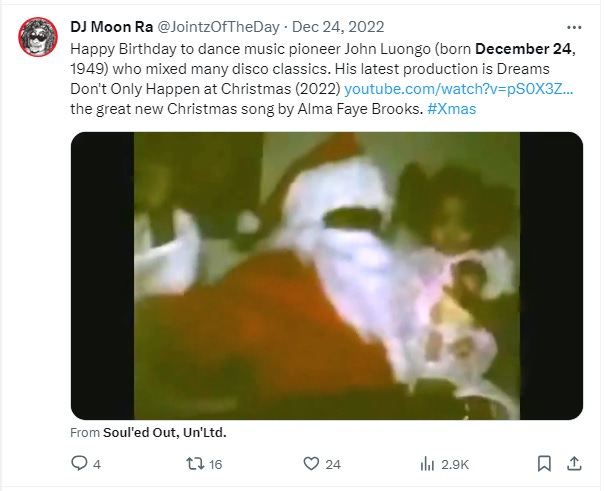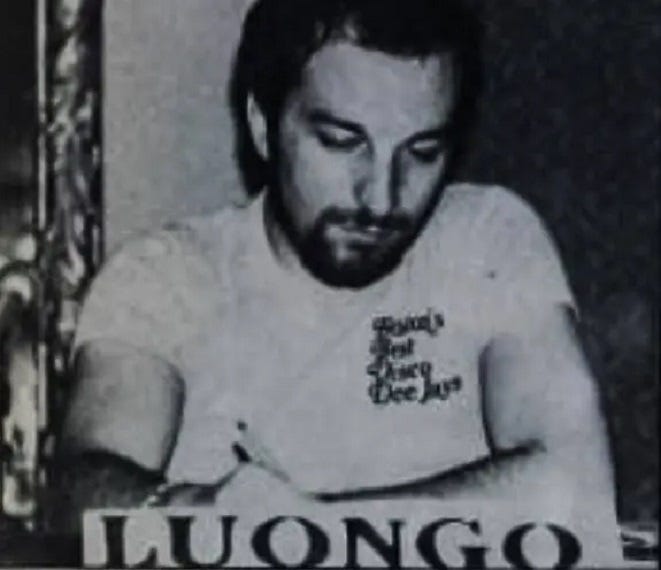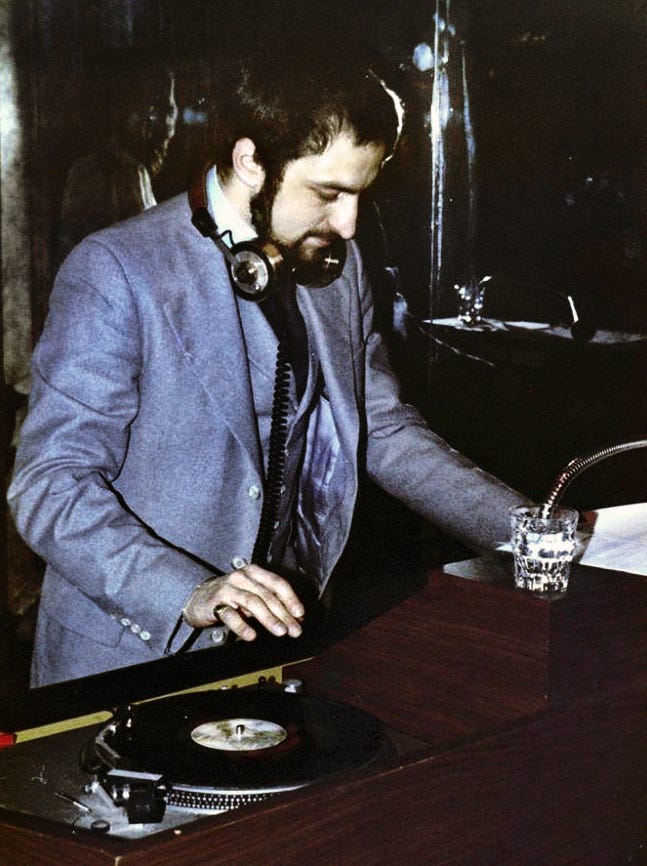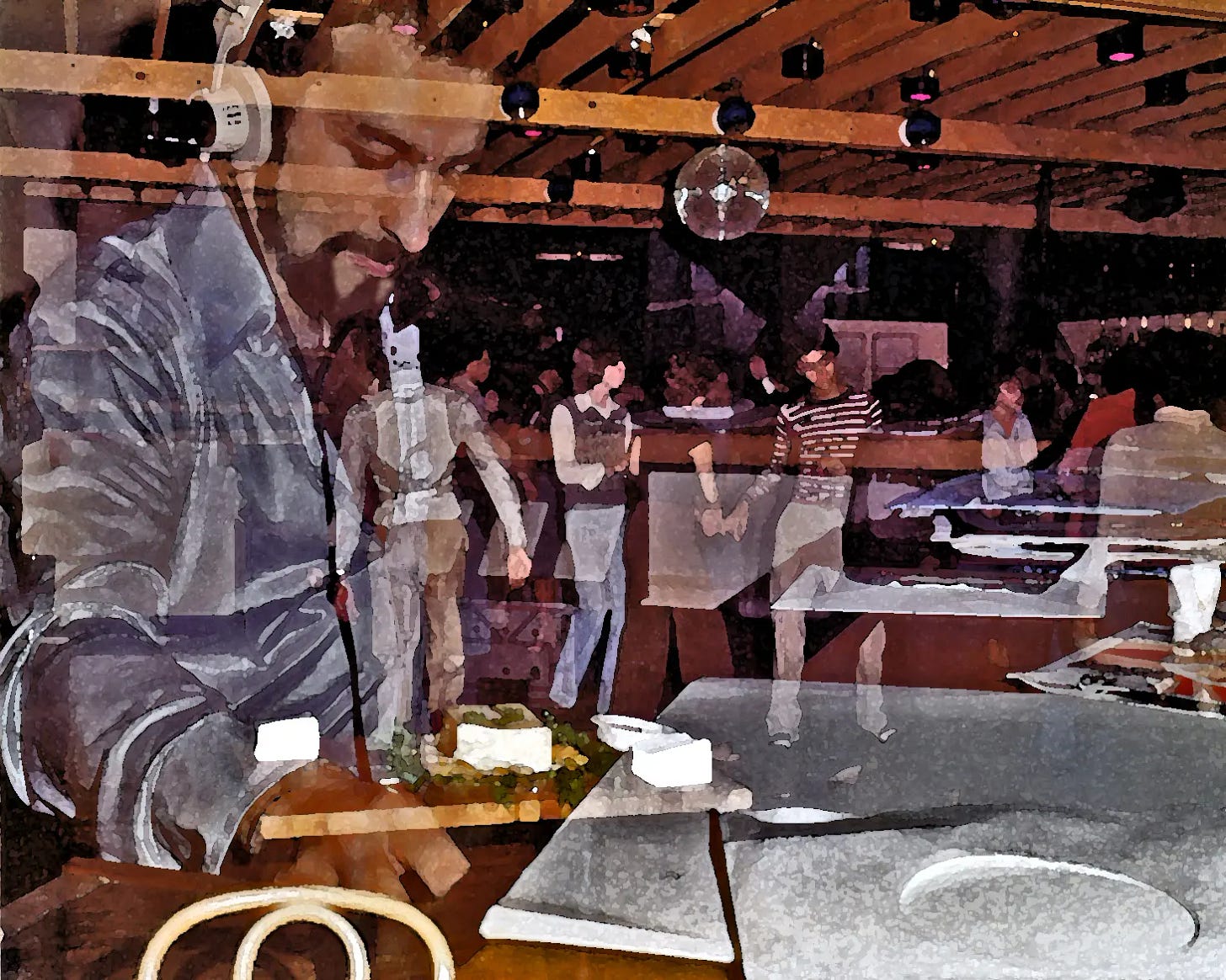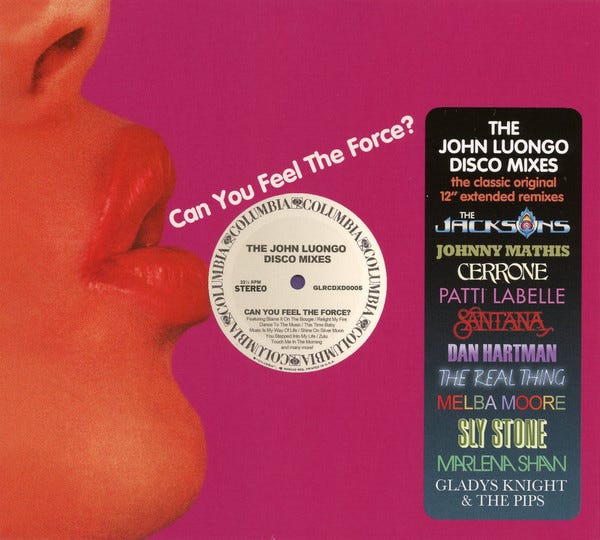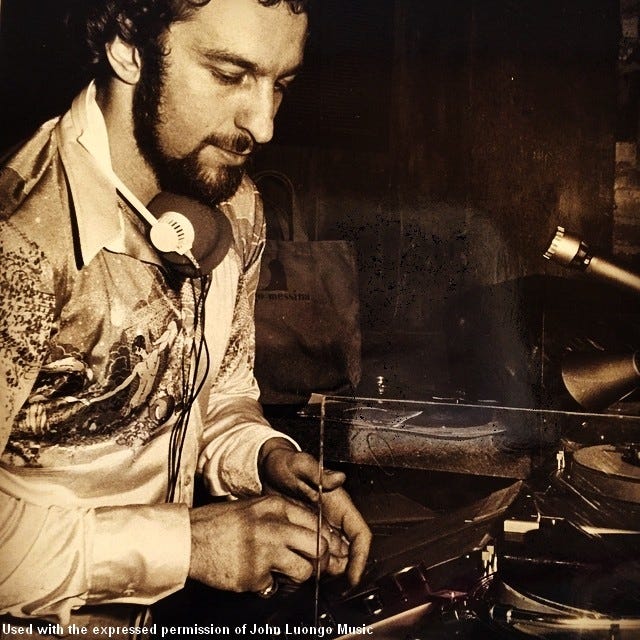John Luongo (born December 24, 1949) – Dreams Don't Only Happen at Christmas (2022)
The remix pioneer who helped the disco movement take off produced Alma Faye Brooks' modern Christmas classic with a message for us to love each other.
Watch full video on YouTube.
View most updated version of this post on Substack.
Open YouTube playlist of all songs in this post.
John Luongo is a dance music and record industry legend. He was one of the first disco DJ’s in the United States, and his tireless efforts to promote the music helped disco become a national phenomenon in the 1970s. Luongo was also one of the first disco remixers, and the first to be credited with additional production on his remixes as he lent his magic touch to many dancefloor classics. In the 80s and 90s he worked with a wide variety of artists, becoming arguably the most diverse remixer of all time.
John Patrick Luongo was born in Boston and raised in nearby Everett, Massachusetts. As a teenager, he listened to Boston R&B station WILD-AM and the late-night soul and funk show The Ghetto on MIT’s student radio station WTBS, and would fall asleep with the radio still on. He started college at Northeastern University in the fall of 1968 studying civil engineering, where he went on air for the first time as a DJ for inter-campus radio station WNEU.
He began his career as a nightclub DJ in Boston during late 1968, a time period that put him in the running with Francis Grasso of New York City for the title of first modern disco DJ in the United States. One afternoon he and some friends went to the Bull and Finch pub on Beacon Street, where the exteriors of the 80s sitcom Cheers would later be filmed. The upstairs was a club called The Townhouse, and he gave his number to the DJ, asking if he could fill in sometime. Less than a week later, that DJ quit and gave Luongo’s number to the manager, who called him on a Thursday and told him to show up the next night. In an interview with Disco-Disco.com, Luongo recalled what happened next:
“I went to the local record store and bought all the newest and classic 7" single songs that I thought I needed. I went in with butterflies in my stomach and the rest is history. After only one month the club became the number one night spot in the city. We had crowds around the block waiting to get in each evening and became extremely influential…on the local radio scene for pop, R&B and rock music. The audiences on the weekend were totally into the music, the scene and the fun of it all. We redefined how dance and R&B records got on the radio and broke in Boston.”
His quick cut mixing style, pioneering blending techniques and diverse choice of soul, funk and rock records quickly found a following in the clubs where he worked and when he hosted shows on Boston radio stations.
During the early 70s he helped lay the foundation for Boston's flourishing disco scene, which grew in size and influence to rival only New York City's. He launched Nightfall Magazine (a publication devoted to all things disco), founded one of the nation’s first three record pools, and established the first National Disco Awards.
Luongo then became one of the first disco remixers. As he later described his earliest project:
“My very first remix was a record I did out of Boston [in 1974] called "I Just Wanna Say I Love You" by a local artist named Leon Collins on ELF Records. I got feedback all the way from New York that the record was a killer and the clubs all used the break in it, as they thought it was slamming.”
Although Luongo co-produced the original release, his extended remix on the track’s promo-only “Long Version” was uncredited.
His next remix was the 12” extended disco version of “Dancing Free” by San Francisco disco group Hot Ice. It was released on Oakland’s Rage Records in 1976, although his mix work was again uncredited.
The positive dancefloor reception that greeted his early remixes led to his big career break, when in early 1978 he was hired to remix Melba Moore’s cover of the Bee Gees’ “You Stepped Into My Life” (as told in our previous post on Melba Moore).
Luongo soon helped create numerous iconic dancefloor hits for artists including the Jacksons, Patti LaBelle, Sarah Dash, Sly Stone, Jackie Moore (“This Time Baby”), and Gladys Knight & the Pips.
Three of his mixes reached #1 on disco charts in 1979 alone, including Dan Hartman’s masterpiece “Vertigo/Relight My Fire.”
The second remix Luongo did for the Jacksons, a reworked version of “Shake Your Body (Down To The Ground)” (1979), helped revive their career at a moment when they were about to be dropped by their post-Motown label Epic Records. Its percussion techniques combined with those on Luongo's previous remix of “Blame It On The Boogie” (1978) directly influenced the dancefloor-friendly sound that Quincy Jones crafted shortly afterwards for Michael Jackson's breakthrough solo LP Off The Wall. See our earlier post on MJ for more on his remix of “Walk Right Now” from the Jacksons’ 1980 Triumph LP.
In 1975, Luongo was the first DJ in the U.S. to play Donna Summer's epic first disco single produced by Giorgio Moroder, “Love To Love You Baby.” Summer herself was in the club to witness its dancefloor premiere (as told in our previous post on Donna Summer).
He went on to become the national disco coordinator for MK Dance Promotions, selected as Billboard's “Disco Promotion Company of the Year” in 1978. He helped Vicki Sue Robinson’s “Turn This Beat Around” become the #1 pop song in Boston in 1976, which started its climb from #1 on dance charts to #10 on the national Billboard Hot 100, one of the key songs that helped disco cross over to a mass audience. In 1977, he helped break Chic’s first record “Dance, Dance, Dance” (as told in our previous post on Bernard Edwards).
Luongo and Danae Jacovidis co-mixed “Kind Of Life (Kind Of Love)” for West End Records in 1979. An uplifting tribute to Boston's North End, it was co-written and co-produced by Russell Presto, Anthony Carbone, and Arthur Baker, who was a writer for Nightfall Magazine before becoming a superstar producer. The record was a dancefloor hit and helped save West End from going under at a time of financial uncertainty for the label.
At age 29, Luongo became one of the youngest heads of a record label in history when in 1979 he founded and was named President of Pavillion Records, the new dance music imprint of CBS. The extra “L” in the label’s name stood for “Luongo.” There he notched more #1 dance hits and was the first to offer Madonna a major record deal before she signed with Sire Records.
Luongo broadened his remix work in the 80s and 90s to become arguably the most diverse remixer of all time, bringing his magic touch to hits by artists as varied as Queen, Tina Turner, Al Jarreau, Dolly Parton, Bobby Brown, Huey Lewis & The News, Don Henley, John Waite, Cher, KISS, Debbie Harry, and Aerosmith.
In 1984, he mixed and edited British musician John Waite’s #1 Hot 100 hit “Missing You,” which was the final song Waite recorded for his second album No Brakes in a deliberate attempt to create a hit single. After Luongo emerged from the studio, Waite sent his girlfriend Nina Blackwood (at the time a VJ on MTV) to Luongo’s New York City apartment to pick it up and listen to the final mix for the first time. She knew immediately it would be a hit, and Blackwood later revealed Waite had written the song about her.
As the acid house scene gave rise to raves in the UK during the late eighties and early nineties, laying the foundation for modern EDM culture, Luongo remixed what became a highly influential track, the U.S. version of “Right Here, Right Now” (1990) by the British alternative rock band Jesus Jones. Melding an electronic dance sound with indie rock, with lyrics about witnessing the Cold War’s end, it became the most-played song on U.S. college radio stations during 1991. Eventually it climbed to #2 on the Hot 100.
The following year, Luongo co-produced and remixed an extended 12” version of British duo Fortran 5’s dancefloor message song “Look To The Future” (1992) featuring powerful vocals by former Sly & the Family Stone guitar legend Larry Graham.
In recent years, Luongo has produced songs for the great unsung disco diva Alma Faye Brooks. The phenomenal, uplifting disco jam “Con Te Partirò (Time To Say Goodbye)” was released in late 2021 on his label JLM Recordings, co-produced by Luongo and Brooks’ husband and longtime collaborator Louis Toteda. It quickly became a New Year’s Eve dancefloor favorite, and was followed by an explosive roller disco funk remix in 2022.
Brooks gave the world a present for the holiday season in November, 2022, when she released her heartwarming, inspirational modern Christmas classic “Dreams Don’t Only Happen at Christmas.” It was co-produced, arranged, and mixed by Luongo and Toteda, and co-written by Brooks and Toteda. The song’s much-needed message of peace and love reminded us to stop fussing and fighting and live in harmony together.
Luongo’s long and illustrious career as a remixer was recently documented by the new Arthur Baker Presents Dance Masters / John Luongo 6XLP/4XCD box set, released on November 17, 2023.
Happy Birthday to the legendary John Luongo.
Further info:
John Luongo YouTube channel
“John Luongo – The Restoration Of A Disco Legend,” by Greg Wilson, 2017.
"John Luongo," interview by Brice Najar, 2017.
“This is...John Luongo,” interview, Disco-Disco.com, 2018.
“John Luongo,” by D.S. Monahan, The Music Museum of New England, August 15, 2023.
#soul #funk #disco #AlmaFayeBrooks #JohnLuongo




